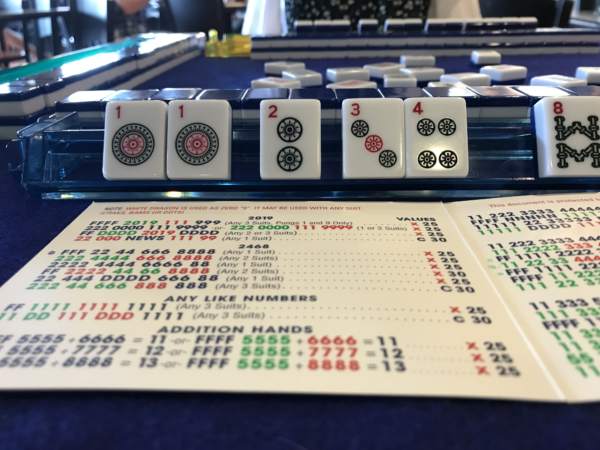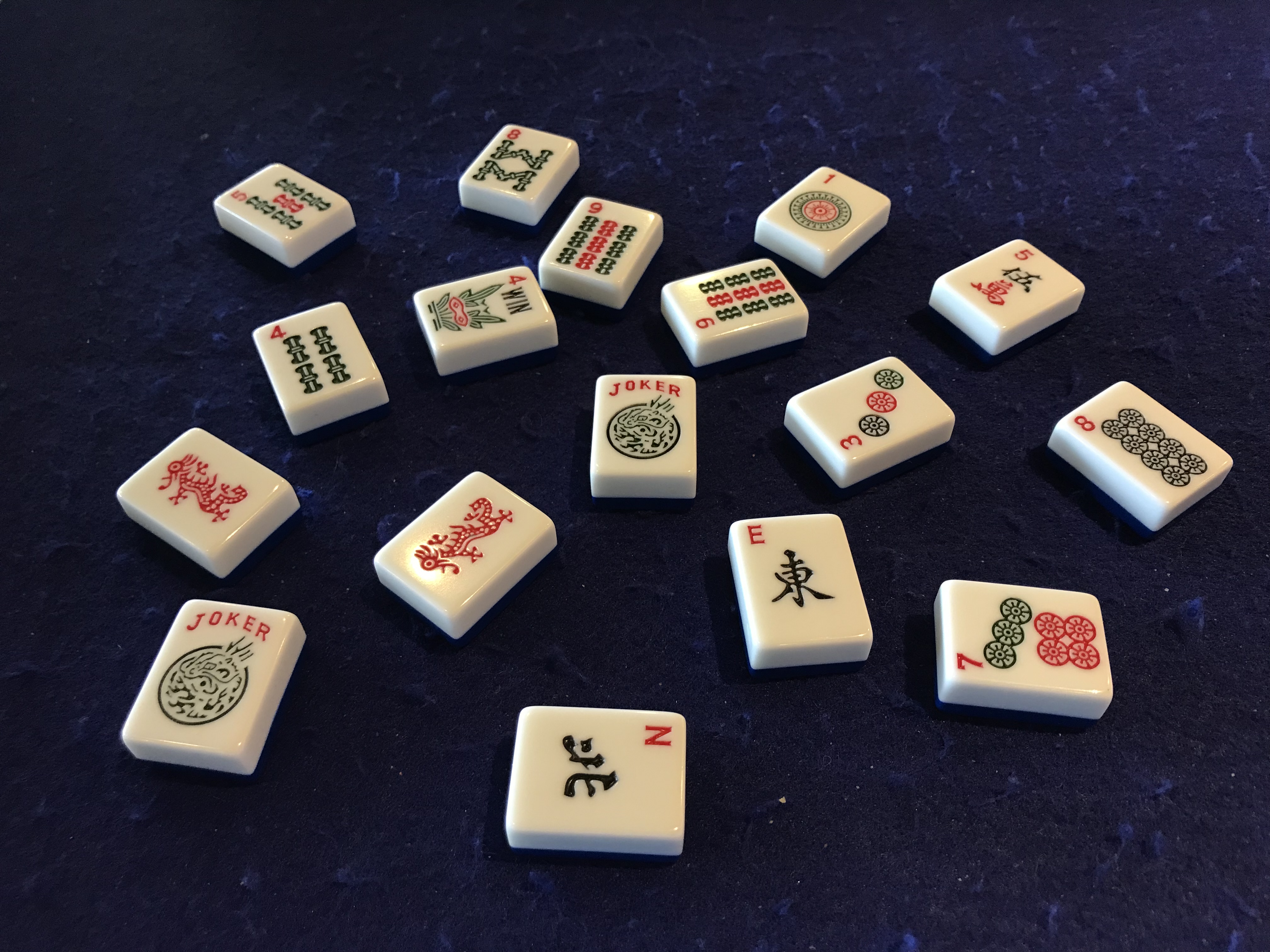Four women sit around a table. Playing cards are laid out in front of each player and tiles are shuffled. Laughter and friendly chit-chat fill the air. The game begins; phrases that might seem foreign to bystanders replace the chit-chat, and off they go. Four Crak! Two Bam! Three Dot! Around the table it goes until someone calls out “Mah Jongg” and wins the game.
Every Monday night, a group of around eight women gather at Jason Deli’s in Knoxville, Tennessee, to play a Chinese tile-based game called Mah Jongg. Throughout the evening, customers come and go, but for a couple of hours five tables are taken over by two or more Mah Jongg sets, purses, and empty dinner plates. For the ladies, it is not just a game to pass the time but a gathering that allows a group of friends to socialize and maybe even gain some health benefits.
But, how did a Chinese tile-based game make its way throughout the United States and all the way to a deli in Tennessee?
The Beginnings
According to the National Mah Jongg League, while the game originated in China, its exact origins are hidden behind myths and stories.
My Jewish Learning.com explains one those origin stories: “Around 1846, a servant of the Chinese emperor combined the rules of popular card games and replaced cards with tiles to create Mah-Jongg.”
Slight variations developed between the American and Chinese versions of the game. The American version uses more tiles, includes the use of a Joker, and begins the game with a sequence called “The Charleston,” where players exchange tiles amongst each other. Online versions of Mah Jongg exist; however, it is typically more for single-player use.
The game did not become popular in the U.S. until the 20th century, when an American businessman, Joseph Babcock, brought the game home after a trip to China.
In 1937, a group of Jewish women formed the National Mah Jongg League in New York City. They created the league to help maintain the consistency of the game, and the league issues an annual playing card with new hands that players can use during the game.
During the mid-20th century, Mah Jongg became a staple for Jewish families during summer vacations in the bungalow colonies in the Catskills.
“The women would go up for the whole summer with the kids, and the husbands would come up on the weekends,” Sandy Parker, a Knoxville Mah Jongg player, said. “During the week, the women would take turns and play [Mah Jongg] in different cabins. They played fives so when it was your turn to be out, you went and checked all the cabins to make sure all the kids were okay.”
Another way this game has been kept alive over the years is through each generation passing down of the love for the game to the next.
“My grandma taught me, and I was 8 years old, and that was 66 years ago,” Parker said.
Memories of playing Mah Jongg and the game sets themselves can span up to three generations for some Jewish women, with daughters learning from their mothers who were taught by their mothers.

“It is more of a tradition in the household [for Jewish families], and this set was my mother’s,” Parker said, referring to the set arrayed in front of her.
A whole lot of friendship with a sprinkle of health benefits
Although some people have been playing Mah Jongg for most of their lives, others have just recently started playing the old Chinese tile game.
“I learned five years ago from a person that Marian [Jay] taught,” Diana Tonn, a Knoxville Mah Jongg player, said. “The person who taught me said you have to commit six weeks to this to learn it, and some people drop out because they don’t like it. I was addicted. I was totally addicted, and now I try to play every week.”
It’s not just the game that brings players back.
“Five years ago, I thought I was too old to be making friends,” Tonn said. “I now have about 25 new friends.”
The social aspect of the game is one of the main components that keeps the ladies coming back to play every Monday.
“Kind of network on life,” Parker said. “If you need a good pediatrician or your husband is being a pain in the ass or something.”
A study conducted by PhD candidate and Stanford scholar Annelise Heinz in 2013 examined the social aspect of Mah Jongg and how it played a vital role in the longevity of the game for Chinese and Jewish communities in the U.S.
“That’s another nice thing about the group. They are all very open to hearing about grandchildren, and I can ask advice,” Tonn said. “I’ve met a couple of Sandy’s grandchildren.”
“It’s a fun game. For me, it’s my special Monday night that I look forward to,” Marian Jay, co-founder of the group, said. “I think if I didn’t have that, it would make me sad because I wouldn’t be seeing the people that I usually see when I play.”
The strategic thinking necessary in Mah Jongg and other games like Rummikub and crossword puzzles has been linked to various health benefits, including cognitive skills improvement and stress reduction.
Jay said that Mah Jongg not only has health benefits, but playing and socializing amongst friends also helps to keep players young.
“Don’t let them kid you,” Parker said. “It’s also fun and it’s camaraderie, I think more than anything.”
At the end of the day, Mah Jongg, Gin Rummy, Monopoly, and countless other games allow people of all ages to experience joy and create bonds within friendships.
Every Monday night at Jason’s Deli, a group of ladies get together to play a Chinese tile game with a deep history. As a result, friendships grow and strengthen as advice and gossip fly.
“Whatever happens in Maahj,” Parker said, “stays in Maahj.”
Vanessa Rodriguez graduated from the University of Tennessee with a degree in Journalism and Electronic Media in May 2019. She was the Editor in Chief of the student-run news publication of the School of Journalism and Electronic Media, The Tennessee Journalist. She hopes to be a writer or an editor at a Jewish publication.

